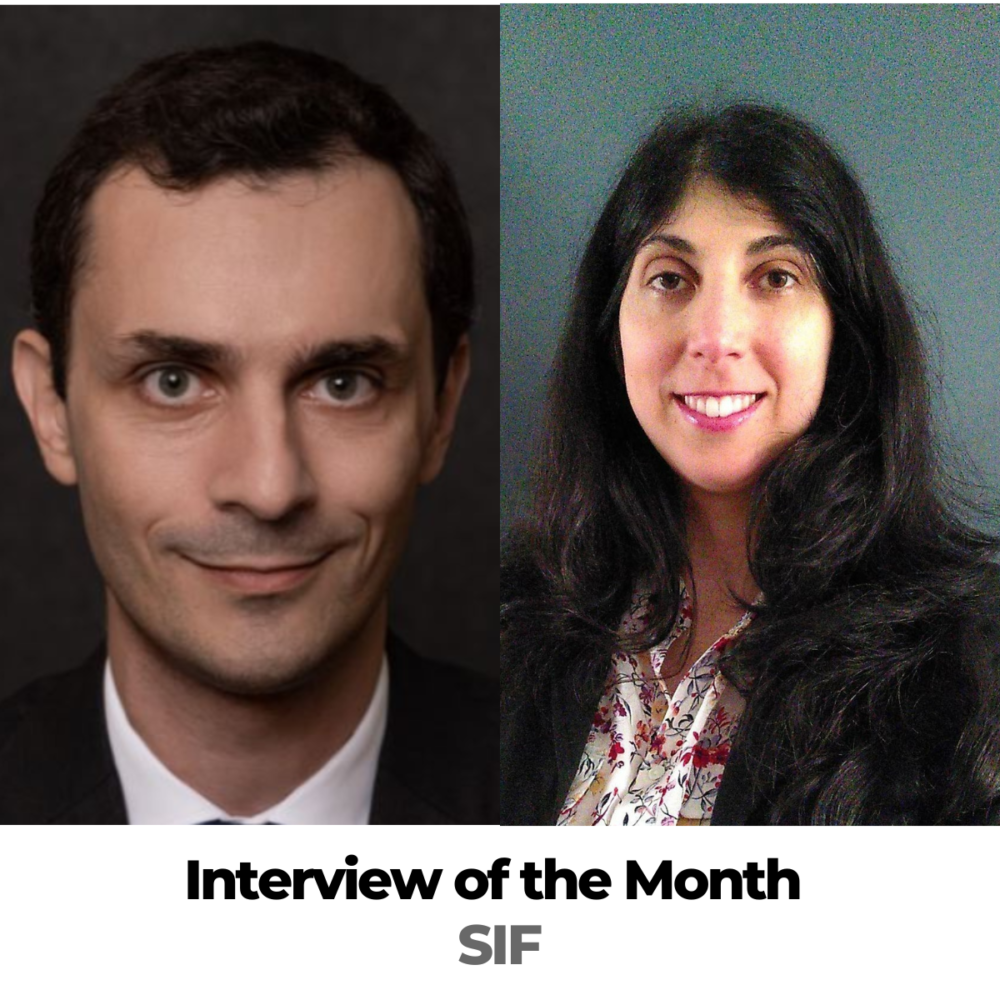
Interview of the Month : SIF
The State Secretariat for International Finance represents Switzerland’s interests in financial, monetary and tax matters not only vis-à-vis partner countries but also in the competent international bodies. It is committed to good framework conditions to ensure that Switzerland can have a secure, competitive and globally recognised financial centre and business location. The State Secretariat is also responsible for implementing the financial market policy of the Federal Council.
In November, the Federal Council published a position on greenwashing. In the position, they stated more needs to be done to ensure there is common understanding about the criteria needed to label a financial product sustainable. We sat down with Christoph Baumann, Envoy for Sustainable Finance at SIF, and Eszter Major, Lawyer at SIF, to learn more about how SIF will take the greenwashing position forward and other initiatives they have underway to enhance the sustainability of the Swiss financial centre.
Given the risks associated with greenwashing outlined by the Federal Council, could you elaborate on the specific concerns the council has regarding the potential misleading of clients, investors, and insured persons in the financial sector?
For the Federal Council, it is essential that if a financial product or service is presented as “sustainable” to customers, it also pursues sustainable investment objectives. The range of products marketed as sustainable has grown considerably in recent years. However, there is a lack of clarity as to what constitutes a sustainable investment. As an example, for collective investments, in 2022, assessments of the “sustainable” proportion of the Swiss market ranged from 4%[1] to 53%[2] of the market. This lack of clarity affects the credibility of this market segment. What’s more, some financial institutions may present their products and services as sustainable, without them meeting credible sustainability criteria and standards. This could lead to a loss of customer confidence.
The Federal Council emphasizes the need for a common understanding in the financial sector about general criteria permitting investment objectives to be labeled as sustainable. How does the Council envision arriving at this common understanding? Will it build off work that has been done in other jurisdictions, like the EU for example?
On December 16, 2022, the Federal Council laid down the basic principles it considers necessary to prevent greenwashing, adopting a position based on the intentionality of investments [3]. Thus, a financial product or service being presented as sustainable should be aligned with one or more specified sustainability objectives, or contribute to the achievement of one or more specified sustainability objectives. These sustainability objectives should be defined in relation to a widely used reference framework, such as the Sustainable Development Goals. The Federal Council also believes that additional elements are needed to create the desired credibility: a description of the sustainability approaches applied, accountability, verification by an independent third party, binding nature, enforceability of rights and access to legal recourse for customers.
The Federal Department of Finance (FDF) is currently working on a draft state regulation to implement the Federal Council’s position. It is also closely monitoring developments in the prevention of greenwashing in other jurisdictions. Of particular interest is the publication by the UK’s Financial Conduct Authority on November 28, 2023 of its Policy Statement PS23/16 Sustainability Disclosure Requirements (SDR) and investment labels, as well as the assessment of the European Regulation on Sustainability Reporting in the Financial Services Sector initiated by the European Commission in September 2023. The FDF is working hard to prepare a draft that meets the expectations of the Federal Council, while remaining compatible with the approaches applied in other countries.
Are the days of pursuing purely financial objectives over? Are we reaching an evolved understanding of what a future-proof investment is (i.e. considering both financial and societal objectives)? Does our current definition of fiduciary duty allow for this?
In its position, the Federal Council does not propose introducing an obligation to pursue non-financial objectives. Investors remain free to determine their investment objectives, which may therefore remain exclusively financial. The financial service provider also remains free to offer sustainable or non-sustainable products or services. However, if they wish to pursue sustainability objectives, investors must have the clarity they need to decide whether or not to invest in a financial product or service presented as sustainable. The Federal Council also considered that taking ESG risks into account falls within the scope of fiduciary duties. It did not rule on the question of whether this duty could, in certain cases, extend to taking into account the impact of investments on the environment and society.
A general trend can be observed in this area. As long ago as 2020, the SBA recognized the importance of taking ESG factors into account in the advisory process, publishing a guide to this effect. In June 2022, this topic gained further prominence, when the SBA adopted guidelines on the integration of ESG preferences and ESG risks in investment advice and asset management. Developments in the European Union have moved in the same direction, with the integration of sustainability factors into the advisory and portfolio management process in 2021, in MIFID 2.
Since the publication of the Federal Council’s position on the prevention of greenwashing, the Climate and Innovation Act has been approved by popular vote on June 18, 2023. This stipulates that Swiss financial flows must be oriented in such a way as to make them compatible with climate objectives (art. 1, let. c) and that the Confederation must ensure that the Swiss financial center makes an effective contribution to these objectives (art. 9). Current legislation does not explicitly require the Swiss financial center to take into account the climate impact of their investments. Moreover, achieving a sustainability objective can be a means of improving financial performance. It is also important to keep abreast of international developments in this field, whether through internationally commissioned studies (e.g. Freshfields Bruckhaus Deringer, A Legal Framework for Impact, 2021, UN PRI, Generation Foundation and UNEP FI) or through climate litigation.
The SIF will set up a working group to determine the best way to implement the Federal Council’s position on preventing greenwashing. Can you elaborate on the key considerations and challenges the working group anticipates? Are there any initial thoughts on how to ensure the chosen solution is both binding and enforceable across the financial market?
On behalf of the Federal Council, the SFI set up a working group in December 2022. After evaluating the contributions of the working group members, the FDF has decided to draw up a draft state regulation based on the principles, in the form of an ordinance. This will be a one-off amending act, introducing a minimum standard in topical ordinances. The FDF will submit a draft for consultation to the Federal Council by the end of August 2024 at the latest. If the financial sector submits a self-regulation proposal that effectively implements the Federal Council’s position, the FDF will forego regulatory work. Even if the regulatory route is ultimately chosen, the financial sectors will retain the option of supplementing the legal framework with self-regulatory standards.
Is the SIF currently exploring other sustainable finance issues beyond greenwashing?
We remain committed to realizing the 2022-2025 Areas of Action that the Federal Council published last year, these include sustainability data, transparency, impact investments, as well as working in multilateral institutions to put a price on pollution. The advancements on greenwashing fits within the transparency bucket, so does our current revision of the Swiss Climate Scores that provide transparency on the Paris-alignment of investment products and mandates. On data, the Federal Council’s ordinance on mandatory climate disclosures will come into effect on January 1 of 2024 for large, listed companies and financial institutions (defined as having 500 or more employees and at least CHF 20 million in total assets or more than CHF 40 million in turnover).
I understand that the SIF is leading a “Building Bridges” delegation to COP28 in the UAE, connecting financial leaders from Switzerland to the international climate negotiations. What do you hope to achieve with this delegation?
The aim of the “Building Bridges” delegation at COP28 is to promote exchange and new contacts, to inform participants about new key developments and innovative initiatives, especially from NGOs, and to confidently position Switzerland’s approaches globally. Many innovative ideas and collaborations arise from informal conversations. At COP28, participants will easier access to key decision-makers. It’s about organizing targeted and strategic meetings with them and talking about concrete future initiatives and measurable progress. I expect the delegation to return from COP28 with inspiration for concrete measures for further credible action to advance the climate goals and to strengthen Switzerland’s position as a global hub for sustainable finance.
[1]: Stüttgen M and Mattmann B, IFZ Sustainable Investments Studie 2022, Lucerne University of Applied Sciences and Arts, 2022
[2]: Swiss Sustainable Finance and University of Zurich, Swiss Sustainable Investment Market Study 2022
[3]: Position of the Federal Council on the prevention of greenwashing in the financial sector (admin.ch)




